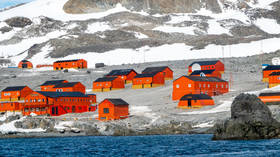Effect from one of world’s few carbon-capturing plants measured

Shell’s multimillion-dollar project “Quest” in Alberta province in western Canada, built to trap and store carbon dioxide emissions, has been criticized as insufficient by an international NGO. In a report by Global Witness published on Thursday, the organization suggests the oil giant’s plant emits “more climate-wrecking gasses than it is capturing.”
According to the investigation, the carbon footprint left by the self-proclaimed “safe and effective” project exceeds the amount of greenhouse gas it has captured. While Shell says the plant’s carbon-capture system has stopped some five million tons of carbon dioxide from entering the atmosphere in less than five years, this “only tells one side of the story,” the report states. Over the same period of time, it released 7.5 million tons of polluting gasses.
The climate damage caused by the plant’s annual carbon footprint is the equivalent of 1.2 million petrol cars, according to Global Witness.
Only a few similar projects exist worldwide, and the Shell-operated Canada plant is being largely subsidized by the government to reduce carbon emissions. However, according to the findings, the plant’s effectiveness has been significantly overstated.
“Just 48% of the plant’s carbon emissions are captured, we found, falling woefully short of the 90% carbon-capture rate promised by industry for fossil hydrogen projects,” the report says. It calls for a halt to support and investment in a technology “that is not only failing to deliver any effective action in tackling the climate crisis – but is in fact contributing to it.”
Earlier this week, a large group of scientists and academics in Canada urged their country’s government not to sponsor companies using the technology. Tax credits should not become “a fossil fuel subsidy,” they said in a letter.
Shell claims its carbon-capture technology “overall has met or exceeded our expectations,” according to Vice, quoting the company’s regional spokesperson. Apparently Quest doesn’t cover the whole facility.
“This analysis is simply wrong. Our Quest facility was designed some years ago as a demonstration project to prove the underlying… concept, while capturing around a third of CO2 emissions,” an unnamed Shell spokesperson said, according to Sky News.
The expensive technology is promoted as a solution to make fossil fuels more environmentally friendly by trapping and storing emissions. A coalition of more than a dozen energy companies has been formed to support a major carbon-capture hub in Houston, US. Shell has recently joined in, supporting the carbon-capture and storage project, which is estimated to cost $100 billion.














